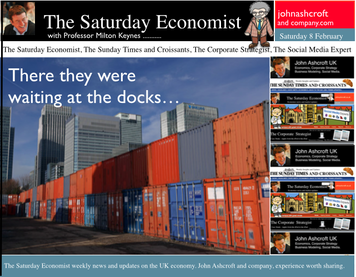 Economics news – UK recovery continues at pace in January ... According to survey data this week, [Markit/CIPS UK PMI® January], the recovery in the UK economy continues at pace into the New Year. Manufacturing, construction and services all continued to demonstrate strong levels of activity. In the manufacturing sector, the strong rebound continued with improved domestic demand and rising export orders suggesting robust growth in the month. Construction survey data suggests the sector is experiencing the sharpest rise in construction output since August 2007. Housing activity is increasing at the sharpest rate for over ten years. Service activity remains elevated with a headline index rate at 58.3 during January, down slightly from 58.8 in December. Service sector output is still at a very high level, anything above 50 suggests growth. The latest monthly NIESR GDP tracker suggests the economy grew by over 3% in January. This week, NIESR also upgraded UK forecasts for growth this year to 2.5% with projections of unemployment falling, inflation tracking the 2% target level and government borrowing continuing to reduce. In fact on current plans, according to the leading think tank, the public sector finances will be in surplus in 2018-19. So much for fears of prolonged austerity to come. So growth up, inflation down, employment up and borrowing down. Just the trade performance is expected to deteriorate with the external current balance increasing from a deficit of £54 billion in 2013 to £78 billion by 2015. ONS Data on Trade ... ONS data this week for trade was a little surprising. The trade deficit in December improved significantly compared to our forecasts. Seasonally adjusted, the UK's deficit on trade in goods and services was estimated to have been £1.0 billion in December 2013, compared with a deficit of £3.6 billion in November 2013. There was a deficit of £7.7 billion on goods, partly offset by an estimated surplus of £6.7 billion on services. Some £2 billion of imports appear to have been lost in the analysis. If domestic demand was as strong as the data suggests, the fall in imports for the month is illogical. In any case, don’t get to excited about the rebalancing agenda - for the year as a whole, the deficit trade in goods was £108 billion. US Payroll data ... Over in the US, payroll data upset the markets as jobs growth proved disappointing for the second month running. US payrolls rose a seasonally adjusted 113,000 in January after gains of just 75,000 in December. The unemployment rate continued to move down, to 6.6% the lowest level since December 2008 and perilously close to the Fed forward guidance hurdle rate. It is thought the latest data is unlikely to change the Fed stance on progressive tapering through 2014. Janet Yellen, the new chair of the Federal Reserve Board, makes her first appearance before Congress next week. Emerging markets will shudder as the adjustment in the stance of QE and tapering continues. Rate rises could be on the US agenda by the end of the year. So what happened to sterling? Sterling closed at $1.6407 from $1.6433 and 1.2030 from 1.2184 against the euro. The dollar closing at 1.3635 from 1.3487 against the euro and 102.31 against the Yen. Oil Price Brent Crude closed at $109.57 from $106.40 The average price in February last year was almost $116. Markets, steadied - The Dow closed at 15,794 from 15,698 and the FTSE closed at 6,571 from 6,5210. UK Ten year gilt yields closed at 2.71 from 2.72 and US Treasury yields closed at 2.69 from 2.65. That’s all for this week. No Sunday Times and Croissants tomorrow or for the rest of this year for that matter. We are taking a break in this pre election year. John Join the mailing list for The Saturday Economist or why not forward to a colleague or friend? The list is growing as is our research and research team. Over ten thousand receive The Saturday Economist each and every week! © 2014 The Saturday Economist. John Ashcroft and Company. Experience worth sharing. The material is based upon information which we consider to be reliable but we do not represent that it is accurate or complete and it should not be relied upon as such. We accept no liability for errors, or omissions of opinion or fact. In particular, no reliance should be placed on the comments on trends in financial markets. The receipt of this email should not be construed as the giving of investment advice. It's just for fun, what's not to like! Dr John Ashcroft is The Saturday Economist.
0 Comments
Leave a Reply. |
The Saturday EconomistAuthorJohn Ashcroft publishes the Saturday Economist. Join the mailing list for updates on the UK and World Economy. Archives
July 2024
Categories
All
|
| The Saturday Economist |
The material is based upon information which we consider to be reliable but we do not represent that it is accurate or complete and it should not be relied upon as such. We accept no liability for errors, or omissions of opinion or fact. In particular, no reliance should be placed on the comments on trends in financial markets. The presentation should not be construed as the giving of investment advice.
|
The Saturday Economist, weekly updates on the UK economy.
Sign Up Now! Stay Up To Date! | Privacy Policy | Terms and Conditions | |
 RSS Feed
RSS Feed